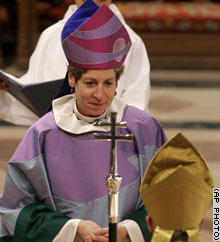New Study: Bush Supporters are Indeed Mentally Ill?
Like most articles that appear in the science section of the newspaper, broadcasting some new finding of a study, e.g. eating fast food makes you obese and eliciting a big "duh" from many of us, the New Haven Advocate just published Christopher Lohse's study (a master's student in Social Work) and found a link between psychotics and Bush supporters.
Lohse, a social work master’s student at Southern Connecticut State University, says he has proven what many progressives have probably suspected for years: a direct link between mental illness and support for President Bush.
Lohse says his study is no joke. The thesis draws on a survey of 69 psychiatric outpatients in three Connecticut locations during the 2004 presidential election. Lohse’s study, backed by SCSU Psychology professor Jaak Rakfeldt and statistician Misty Ginacola, found a correlation between the severity of a person’s psychosis and their preferences for president: The more psychotic the voter, the more likely they were to vote for Bush.
But before you go thinking all your conservative friends are psychotic, listen to Lohse’s explanation.
“Our study shows that psychotic patients prefer an authoritative leader,” Lohse says. “If your world is very mixed up, there’s something very comforting about someone telling you, ‘This is how it’s going to be.’”
The study was an advocacy project of sorts, designed to register mentally ill voters and encourage them to go to the polls, Lohse explains. The Bush trend was revealed later on.
The study used Modified General Assessment Functioning, or MGAF, a 100-point scale that measures the functioning of disabled patients. A second scale, developed by Rakfeldt, was also used. Knowledge of current issues, government and politics were assessed on a 12-item scale devised by the study authors.
“Bush supporters had significantly less knowledge about current issues, government and politics than those who supported Kerry,” the study says.
Lohse says the trend isn’t unique to Bush: A 1977 study by Frumkin & Ibrahim found psychiatric patients preferred Nixon over McGovern in the 1972 election.
Rakfeldt says the study was legitimate, though not intended to show what it did.
“Yes it was a legitimate study but these data were mined after the fact,” Rakfeldt says. “You can ask new questions of the data. I haven’t looked at” Lohse’s conclusions regarding Bush, Rakfeldt says.
“That doesn’t make it illegitimate, it just wasn’t part of the original project.”
For his part, Lohse is a self-described “Reagan revolution fanatic” but said that W. is just “beyond the pale.”
Hat Tip: Ricardo.








